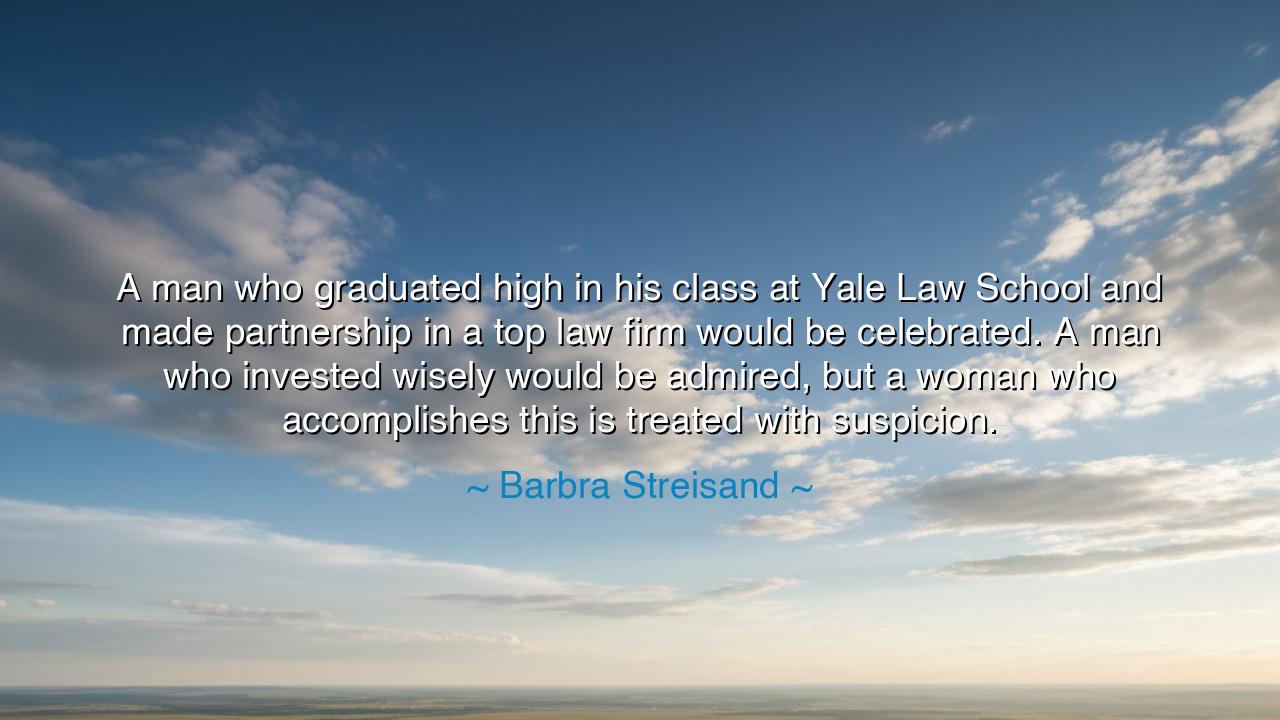
A man who graduated high in his class at Yale Law School and
A man who graduated high in his class at Yale Law School and made partnership in a top law firm would be celebrated. A man who invested wisely would be admired, but a woman who accomplishes this is treated with suspicion.






When Barbra Streisand declared, “A man who graduated high in his class at Yale Law School and made partnership in a top law firm would be celebrated. A man who invested wisely would be admired, but a woman who accomplishes this is treated with suspicion,” she revealed the sharp wound carved into society’s heart. Her words are not only lamentation but a cry of justice, exposing how equal deeds are weighed unequally when performed by different hands. It is a mirror held before civilization, showing both its brilliance and its blindness.
The man who rises through learning, achievement, and wealth is often crowned with laurels, his triumphs proclaimed as natural extensions of his destiny. Yet when a woman treads the same path, the world too often answers not with praise but with doubt, whispers, and shadows of mistrust. The same light that illuminates the man’s success becomes a torch turned harshly upon the woman, demanding explanations, probing her worth, questioning her right to stand among the accomplished.
History has offered us countless examples. Consider the life of Madam C.J. Walker, born the daughter of former slaves, who through determination and genius built a business empire and became the first self-made female millionaire in America. A man of her achievements would have been heralded as a titan of industry, yet she endured skepticism and prejudice, her triumphs attributed to luck or trickery rather than brilliance. Like Streisand’s words, her story unmasks the injustice of a world that too often cloaks its admiration for women in suspicion.
The ancients would remind us: when the balance of the scales is corrupted, the harmony of the cosmos is threatened. To diminish the worth of one half of humanity is to cripple the strength of the whole. How can a society flourish if its daughters are denied the honor freely given to its sons? Wisdom cries out that greatness, whether borne by man or woman, must be met with equal recognition, for truth knows no gender.
Therefore, let this teaching be carried into the future: the triumph of a woman is not a threat but a blessing, not a cause for suspicion but for celebration. To honor her victories is to strengthen the entire body of humanity. Let us then cast off the old blindness, and lift both men and women alike into the light of justice, that the generations to come may inherit a world where worth is measured not by gender, but by the greatness of the soul.






NQNguyen Quynhnga
Streisand’s statement rings true when we consider the subtle and overt ways women are judged more harshly for their success. But why is this the case? Does it reflect deeper societal insecurities about gender roles and expectations, or is it more about an unequal distribution of power in the workplace? How can we, as a society, begin to dismantle these biases and ensure equal recognition for all, regardless of gender?
SLSy Le
This quote sheds light on the often unspoken barriers women face, even when they achieve at the highest levels. If a woman reaches the same professional milestones as a man, why does society still question her accomplishments? Is it because of ingrained cultural stereotypes or societal expectations? What would it take to shift this mindset and ensure that women’s achievements are treated with the same level of respect and admiration as their male counterparts?
VN12. Van Ngoc
Streisand’s words highlight the persistent gender bias that exists in society, where a woman’s success often comes under scrutiny simply because of her gender. This raises an interesting question: are we as a society more comfortable with women occupying traditional roles, and does this bias stem from a deeper discomfort with women succeeding in male-dominated fields? How can we break free from these outdated perceptions and celebrate women’s achievements more equitably?
BLNguyen Hoang Bao Lam
Barbra Streisand’s quote exposes a troubling double standard that women face in professional environments. The same accomplishments that would be celebrated in a man are viewed with suspicion in a woman. This begs the question: why do we still hold women to such different standards, especially in industries where success should be based on merit, not gender? What changes need to be made to ensure women are treated equally and fairly in these spaces?